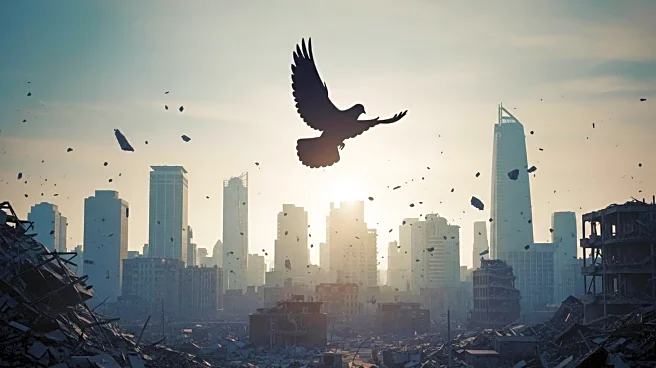What's Happening?
Thousands of Palestinians are returning to Gaza City after being displaced by an Israeli offensive that resulted in significant destruction. The offensive, which included aerial bombardment and troop entry, left much of the city in ruins. Residents are traveling back, many on foot, carrying their remaining belongings. Some are using donkey carts or small trucks, despite high costs. The returnees are finding entire residential blocks flattened and infrastructure destroyed, particularly in areas like Sheikh Radwan, Karama, and Beach Camp. Videos on social media depict the extensive damage, with residents expressing shock at the devastation.
Why It's Important?
The return of displaced Palestinians to Gaza City highlights the severe humanitarian impact of the conflict. The destruction of homes and infrastructure poses significant challenges for the residents, who face a long road to recovery. The situation underscores the ongoing tensions between Israel and Hamas, and the fragile nature of the ceasefire agreement. The humanitarian crisis may prompt international attention and aid efforts, as the displaced population struggles with limited resources and the threat of unexploded ordnance. The broader geopolitical implications could affect regional stability and international relations.
What's Next?
As residents return to Gaza City, the focus will likely shift to rebuilding efforts and addressing the humanitarian needs of the population. International organizations may increase their involvement to provide aid and support reconstruction. The ceasefire agreement's durability will be tested as both sides navigate the aftermath of the conflict. The presence of unexploded ordnance poses ongoing risks, requiring careful management to ensure safety. The political landscape may evolve as stakeholders assess the situation and consider future actions to prevent further escalation.
Beyond the Headlines
The destruction in Gaza City raises ethical questions about the conduct of military operations and the protection of civilian populations. The long-term impact on the community's social fabric and economic prospects is significant, with many families facing displacement and loss. The situation may influence public opinion and policy decisions in the region, as well as international perceptions of the conflict. The role of media in documenting and disseminating information about the devastation is crucial in shaping global awareness and response.










